Copyright 2010, 2012 by Susan K. Delaine Foreword copyright 2010, 2012 by Dr. Peter Bauth Introduction copyright 2010, 2012 by Rebecca Peabody Estepp All photos Shutterstock. Every effort has been made by the author and publisher to ensure the photos accurately represent the finished product. All Rights Reserved. No part of this book may be reproduced in any manner without the express written consent of the publisher, except in the case of brief excerpts in critical reviews or articles.
All inquiries should be addressed to Skyhorse Publishing, 307 West 36th Street, 11th Floor, New York, NY 10018. Skyhorse Publishing books may be purchased in bulk at special discounts for sales promotions, corporate gifts, fund-raising, or educational purposes. Special editions can also be created to specifications. For details, contact the Special Sales Department, Skyhorse Publishing, 307 West 36th Street, 11th Floor, New York, NY 10018 or . Skyhorse and Skyhorse Publishing are registered trademarks of Skyhorse Publishing, Inc., a Delaware corporation. Visit our website at www.skyhorsepublishing.com 10 9 8 7 6 5 4 3 2 1 Library of Congress Cataloging-in-Publication Data is available on file.
ISBN: 978-1-61608-653-4 Printed in China This book is intended to be a resource for autism information and recipes. It is not intended to prevent, diagnose, treat or cure any condition or to provide medical advice. Consult a health or medical professional prior to making dietary changes. Contents  Acknowledgments Thank you Chris Delaine for your amazing mind, patience, strength, peace, will, order, wisdom, and understanding at all times. You are my pillar of strength. Justin and Ryan Delaine, thank you for the honor of being your mom.
Acknowledgments Thank you Chris Delaine for your amazing mind, patience, strength, peace, will, order, wisdom, and understanding at all times. You are my pillar of strength. Justin and Ryan Delaine, thank you for the honor of being your mom.
Parents, families, advocates for children with autism, thank you for writing this book. Children with autism, thank you for teaching the world about unconditional love. Thank you Hester Nena Bell for your encouragement and friendship through the seasons. Thank you for the hard work and personal time you sacrificed to help me with this book. Thank you Kareem Murphy and DeWayne Davis for your wisdom: unconditional love must prevail over tolerance. Your friendship divinely prepared me for the greatest challenge to love, years before its imminent arrival.
Thank you Delaine family, Kelley Family, Debra Nettles Woodard, Annabel Thomas, Ms. Rose, Jessica Schneider, Chris Snell (Fayette County Library), Dr. Peter Bauth, Connie Taylor (Meditating Mantis). To all who have contributed to the greater good and who have helped spread awareness of this work, thank you! Love, Susan  Authors Note T he title of this book expresses the purpose for which it is written. My intention is for you to experience joy and ease in your gluten-free, casein-free (GFCF) journey with your loved one. I have come to find that the key to great GFCF cooking lies in relaxing and enjoying the experience.
Authors Note T he title of this book expresses the purpose for which it is written. My intention is for you to experience joy and ease in your gluten-free, casein-free (GFCF) journey with your loved one. I have come to find that the key to great GFCF cooking lies in relaxing and enjoying the experience.
Dont worryeverything else will flow. Chances are, you have found this book because someone you love has autism, Attention Deficit Hyperactivity Disorder (ADHD), Attention Deficit Disorder (ADD), or a similar developmental challenge. You are interested in a biomedical approach to helping the person gain wellness in his or her body as a way to gain improvements in behavior, focus, attention, and physical comfort. You realize that removing offensive foods is one major part of the wellness approach for all people. Our son was diagnosed with food allergies in 2001 (nine months old) and then diagnosed with autism in 2004 (age three). Within three weeks of changing his diet we began to see improvements in sleep, mood, and language.
At that time, I wrote my first two gluten-free, casein-free, allergy-free cookbooks, Balancing the Bowl 1 & 2. Because of enormous demand for autism resources, my book has blossomed into The Autism Cookbook. We are convinced that a GFCF diet for children like our son is more of a health necessity than a choice. How is this so? Many children with autism cannot digest gluten (a protein found in wheat, barley, rye, and contaminated in most oats) and casein (a protein found in cows milk). This condition is called food intolerance or food sensitivity. Undigested food builds up in the digestive tract and becomes spoiled and toxic.
This wreaks havoc on all body systems, including the brain. Thus, food affects behavior. Visit the recommended websites listed on to further your understanding of cooking GFCF. If you choose to pursue it, you will find plenty of support from grocers, health professionals, educators, family members, and friends who will support you in your GFCF journey. While I have an enormous amount of confidence in your ability to make sound decisions for your child, I am legally obligated to advise you to consult with a medical professional prior to making a dietary change. I hope you will enjoy these rich, international recipes, especially the Korean dishes, straight from my mothers kitchen.
Most importantly, remember your true purpose for seeking a GFCF diet and worry less about making perfectly round pancakes. If your first batch is misshapen, then cut it up, dip it in maple syrup, and share it with someone you love! Foreword H ealth and wellness is all about addressing and correcting the cause; headaches do not result from a lack of aspirin. Indigestion is not a result from a lack of Pepcid. Depression is not a result of a lack of Wellbutrin, and autism is certainly not a condition resulting from a lack of medication. Autism has, as its origins, an imbalance of normal physiology. Addressing this aberrant physiology should be every parents first impulse.
There are many ways to do this. However, with closer consideration, only a few approaches address the primary and the determining causes; the determining being chemical toxicity, physical traumatism, and emotional tendencies or stressors that lead to these aberrant functions; and the primary being the actual manifestation of these stressors, brain hemispheric deficiency, nutritional deficiency subluxation complex, and heavy metal toxicity. For years now, clinicians and researchers have noticed positive changes in the physical and emotional health of children under chiropractic care, for example. Among the observed benefits are improvements in children with hyperactivity, autism, anxiety, low mental stamina, lack of concentration, asthma, and discipline problems. Improvement in grades and IQ have also been recorded. Combine this now with the overwhelming body of evidence that shows direct connections between specific nutritional deficiencies and cognitive health and development issues, and one begins to see a positive paradigm shift emerging in healthcare and the standard treatment of these childhood conditions, such as autismtreatments that have, until recently, been largely ineffective.
In my practice and in the practice of many colleagues, care is given based on this different paradigm of health, and the results are nothing short of extraordinary. Give the information in this book a diligent tryyou have nothing to lose and so very, very much to gain. Dr. Peter Bauth, D.C. LCP Introduction J anuary 1, 2001 was D-Day for my family. No, we did not storm the beaches of Normandy, although at times I felt so challenged that it did seem like a war.
In reality, our D-Day was different. The D stood for diet. It was on that day that my husband and I started our almost three-year-old son, Eric, on the gluten-free casein-free (GFCF) diet. Eric was diagnosed with autism in November of 2000. We were given a grim prognosis by our pediatrician. I also remember having an overwhelming feeling that this trusted pediatrician knew nothing about autism and knew nothing about my son or my family.

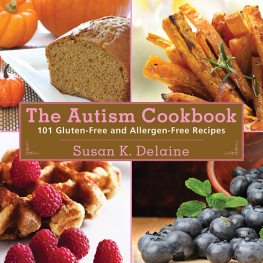
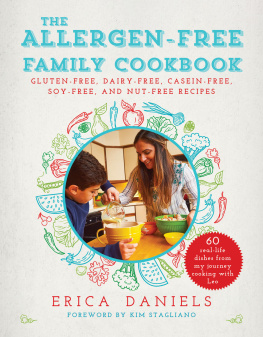


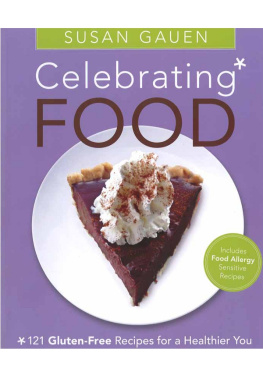
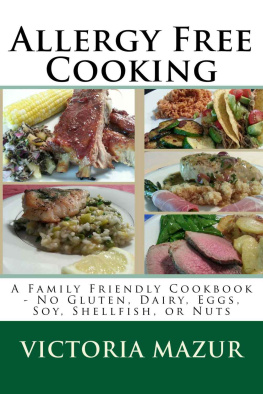


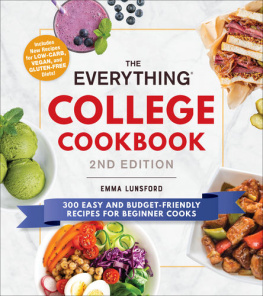


 Acknowledgments Thank you Chris Delaine for your amazing mind, patience, strength, peace, will, order, wisdom, and understanding at all times. You are my pillar of strength. Justin and Ryan Delaine, thank you for the honor of being your mom.
Acknowledgments Thank you Chris Delaine for your amazing mind, patience, strength, peace, will, order, wisdom, and understanding at all times. You are my pillar of strength. Justin and Ryan Delaine, thank you for the honor of being your mom. Authors Note T he title of this book expresses the purpose for which it is written. My intention is for you to experience joy and ease in your gluten-free, casein-free (GFCF) journey with your loved one. I have come to find that the key to great GFCF cooking lies in relaxing and enjoying the experience.
Authors Note T he title of this book expresses the purpose for which it is written. My intention is for you to experience joy and ease in your gluten-free, casein-free (GFCF) journey with your loved one. I have come to find that the key to great GFCF cooking lies in relaxing and enjoying the experience.